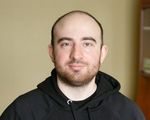About Success Builder
How do you find your place in life? How do you find something to do that both comes naturally to you and makes you happy? The answer is that you have to apply the knowledge you’ve gained from university and from life itself correctly. The Success Builder Project features HSE University graduates who have discovered themselves through an interesting business or an unexpected profession. The protagonists share their experiences and lessons learnt and talk about how they’ve made the most of the opportunities they were given.
When a new direction is being formed in the market, it’s possible to recognize the hype, create the rules yourself, and get rich on your own creativity. In the latest edition of Success Builder, the director of media product development at Russian social networking site VKontakte, Arseniy Ashomko, discusses what the advertising industry looks like from the inside, how the law is useful in any field, and what makes the company VKontakte special besides the juice bar and gym.
The Faculty of Law doesn’t exactly fit in with what you are doing now. Why did you pick law and what were you planning on doing with it at the time?
In school I didn’t know where to go and in which direction to develop. I dreamed of being an aircraft designer as a kid, but then I saw all the negatives to this profession. Then I thought about architecture and journalism, but my mom won – she’s a lawyer. Also, law is a solid educational foundation overall.
I started at HSE in the Faculty of Pre-University Training and then got into the Faculty of Law simply because I liked the people in the Faculty of Pre-University Training. This might not seem like a great reason, but it decided everything. I did start to get the real sense that something wasn’t right my second year. Basic theory courses were ending, and suddenly everything felt foreign in the pedantic digging around in nuances. I found room to breathe by participating in the KVN comedy show. It’s here that I caught the typical bug and realized I wanted to work in advertising. Why? I had an example right in front of me – Yan Oskin, a student at HSE and a rising star in the advertising world. We saw how great his life was – he was only in his 20s – and we wanted to enter into this world as quickly as possible.
I found a job in advertising, and it really drew me in. I even turned down a study abroad trip to Luxembourg. It was at Gameland, and this was my first job. It turned out to be a success.
A degree in law in the baseline for which area? Or just for life in general?
Several subjects in the law curriculum determine your way of thinking. This is the main set of tools that allows you to gain a foothold in any profession. After that you just grow as a manager.
>45 mln
subscribers make up the audience of tigermilk media’s projects (without crossover)
Source: Arseniy Ashomko
The first subject is logic, which provides you with thought methods, forms a core within you, and impacts everything you do. It’s really important in life not to forget how to think logically, especially when you are interacting with creative people and doing something creative. It allows you to do these things not as a crazy artist, but as a professional who wants to achieve a certain result.
The second is theory of state and law. This is an advanced level of social studies, and it tells you how institutions of human thought and management developed. It teaches you to understand human behaviour, which means planning your own actions and understanding objectives. That’s why so many managers have a law degree.
The third important subject is history, which is good because it allows you to learn from your mistakes, see patterns, and understand where everything is headed.
Is a degree in advertising key to succeeding in the advertising industry?
It can now be said that you get an education while actually working in advertising. When I started working in the late 2000s, advertising experts didn’t have a specialized education. It was like KVN, but more hands-on. I sensed a huge number of gaps, but they were quickly filled through practice. After a year you learn what’s what, after three you’re building a career, and after six you’re already a guru. If you don’t burn out.
Advertising is a fairly harsh field. What sold you on it and even led you to love it?
How could one not be seduced by the life of an advertiser in the early 2000s? You woke up, drank champagne, worked two minutes, and went to ride in your gold limousine. When everything in advertising was simple, you could build a career quickly in a younger market and without an education. You could instantly achieve success and make a lot thanks to your qualities, spunk, creativity, and ability to sell an idea. At least that’s what it looked like from the outside. The flexible schedule is also attractive. If you are creating, then people are only looking for you to give them results. You can do three months of work in three hours and then head off to Thailand.
Of course, there are many more nuances in practice, but the enchanting fairy-tale was you could make a lot of money for doing almost nothing
But the market got more mature each year, and competition intensified. That’s why the pretty fairy-tale slowly but surely morphed into your more common conveyor belt. And there generally aren’t any 99 Francs to follow.
Was that how it was in your case?
I just wanted to make money through creativity. This was my motivation for entering the advertising world.
What knowledge did you gain on the job, and what valuable experience did you acquire along the way?
While working at Gameland, I got the idea to integrate brands into games on social media. The main thing was this was successful when put into practice. This success actually made me sceptical towards a formal education that trains specialists in younger, not-yet-formed industries. Only a handful of programmes are able to make sense of the processes and results so quickly and pass on their knowledge effectively. Most knowledge is acquired only in practice through everyday activities. You give presentations, talk with partners and colleagues, tell your clients about something, and try to understand what they want and why they think the way they do. A lot of useful things can be gleaned from sales trainings, but these are singular skills. I got lucky and got in when the market was only forming. On the one hand there was nothing concrete, but on the other a lot is forgiven and it’s rather hard at this stage to get rid of the stupidity that could cost you a career. I remember how many dumb mistakes I made – the sorts of things that wouldn’t fly nowadays. But back then it was trial and error and allowed you to grow.
How did you get into management?
After two years at Gameland, one of the higher ups at the company, Pasha Romanovski, saw in my success an entire area for development and decided to create an offshoot startup, which I cofounded. This was the company Socialist (now Socialist Group), and the idea was to develop ways of selling advertising in social games. In 2010, social networks as a form of turnover were only starting to gain traction for advertisers as a place for investing money. I was actually the company’s creative director, and one of my main tasks was to look for ways to develop business: bring in new clients, create new tools, and monitor for markets in search of new ideas. One of these ideas was the integration of advertising into popular pages on VKontakte.
>1 bln
rubles a year is what VKontakte pays content authors under partner programmes alone
Source: Arseniy Ashomko
At Gameland, we also thought about the most aesthetically pleasing ways to surround a user with materials he or she finds interesting. For example, if you play videogames, then you’d certainly buy more than just a magazine about them. You would visit key websites, go to exhibitions, and even watch topical TV channels.
But this idea was really able to flourish with the start of the social networking era. That’s when we started tigermilk. Not a single one of the founders wanted to be the main one, which is why the company spent a long time looking for a suitable CEO. By that time, I had already grown bored of the stability at Socialist and recommended myself. This is how I became one of the people behind the idea for the project’s multichannel aspects. At the same time, I was trying to turn tigermilk from a hardcore startup into an actual company, and in the process, I got a taste of the administrative work involved.
How did your approach towards work and life change with the title, responsibility, and managerial duties?
At the top you create the main rules of the game and then watch how they’re carried out. I’m good at this – setting boundaries, explaining objectives, and correcting course if something isn’t working out. I had to learn about specific regulations step by step though. As the CEO I focused on the things they teach you in your first few courses of the Faculty of Law. I tried to use history to understand how everything should unfold and logic to find the most important rules. As for state and law, I created fundamental guidelines and maintained a sense of justice in the minds of my subordinates.
The CEO is the company’s unhappiest person. He can’t do anything with his own hands, and he’s pressured from above. I have some greys in my beard primarily as a result of the four years I served as tigermilk’s CEO. But I started seeing a lot of things differently, things to which I previously hadn’t paid any attention. You learn to detach yourself, determine what’s primary and what’s secondary, and sacrifice certain things. If you do all of this right, you become Superman or the Terminator somewhat.
Tigermilk is based on the idea of multichannel media, which is when a user is unable to ‘run away’ from content because there’s content everywhere. What is behind this concept, and how relevant is it today?
Media doesn’t necessarily need a website to which all traffic is directed. It’s simpler to distribute content anywhere that’s convenient for the user. This was initially the concept of multichannality in the purest sense. But it oftentimes doesn’t exist by itself; traditional media is starting to monetize projects that may not be linked to a website. Meduza, for instance, is selling a special video project to Sberbank. The goal of the project is not to get video views on their site, but to get video views period, specifically on social networks. There’s a KPI there.
If your objective is to show something, capture an audience, and deliver something to them, then it’s not as important where this happens exactly. What’s important is the result
As a concept, this is an important stage in the media’s thinking.
The digital environment is very fluid. What is the viability of these sorts of projects?
If you develop hype in a pure sense of the word, then you just have to put your Oscar on the shelf in order for the project to become memorable. But companies are created to last for more than a single season, and if you analyse everything, then chances are you’ll understand the logic of the market and create your product in the right way. Plus, it’s necessary to work one or two ticks faster in order to offer a product that will be needed tomorrow and so that you are evolving with the market. At a certain point, Nokia got stuck with a quarterly KPI and missed the opportunity to make a splash.
What attracted you to work at VK?
I felt that my marginal utility at tigermilk was diminishing. The main aspect – a push towards development – was done, and after that a certain managerial routine had developed that wasn’t for me. At the bottom, younger employees were competing, so why not give them a shot? I left tigermilk nearly a year ago. Then I got an offer and started down a completely new path with VK. Something had kept me connected to social networking for a while, and I wanted to end up here, so their offer seemed logical.
It was assumed that my first important competency was my understanding of the media market, how everything is set up, and what the needs are of authors, advertisers, and subscribers. The company’s culture is very young and specific. There’s a unique team here, and it’s impossible to get in just because you’re a ‘cool dude.’ That was my first lesson on the new job. Within the company, I only earn the trust points that I’ll later be able to spend effectively.
Aside from a unique team, what makes VKontakte unique?
Sure, there’s a juice bar, a gym, flexible work schedule, and panoramic views, but there are a lot of companies with cool offices and great people. What I like about VK is the potential one has to carry out ideas. It’s just an untilled field of possibilities. The company has a very fluid structure, and major changes have been underway for the last several years. VK is constantly dynamic, which is probably the main quality of working here.
What new communication technologies are being discussed or tested at the company?
>6,5 bln
is how many messages VKontakte users send each day
Source: Arseniy Ashomko
The development of a large platform is not always connected to constant revolutions. This is more the evolutionary path for many unnoticed improvements. Over the last year, a lot of algorithms and tools related to AI and neural networks have been perfected, and with time these should be making decisions for people. It’s now possible to create long-reads, and I think that this is the most interesting media tool. It’s also the most important feature in terms of good monetization prospects. Additionally, we’ve launched a platform for podcasts. For now, this feature is only available for those who submit an application and go through a basic selection process. All of these advancements are important from an ideological standpoint and open up new opportunities for users to interact with content. Self-expression, content sharing, and likes on social media have always been possible, but turning this into a business within the platform – that’s a problem that is slowly but surely being solved.
Platforms and the media are now obsessed with monetizing everything. How do you, for example, define high-quality media that’s worthy of paid subscriptions?
It has to carry some value for me that others don’t. Here’s a personal example – I am subscribed to Vedomosti and Republic.ru. At a certain point I realized I needed the information these media sources offer. Vedomosti is a supplier of important business information, and I’ve been subscribed for a long time because it was cheap. There is exclusive material there, and overall it’s a must have. You understand that you’re paying for a necessity that maintains your level of involvement in life. Republic.ru is a little different, but its value is similar for me. These are my personal tastes, however, and everyone has their own criteria.
What would you want to tell students from the faculty if you were to become a lecturer or invited expert there?
I sometimes give lectures at HSE. All of my strengths as an expert are probably connected to history and theory – that is, with a certain foundation and baseline. I think it’s pointless for a core curriculum to try to keep up with the trends. Over the course of an academic year, you’ll see several generations of ever-changing tools within your professional environment. It’s important to teach students to think, and for this you have to return to a general understanding of historical perspective and a theoretical basis.
What mostly bother me are books with titles like ‘How to Make Money on This or That Social Networking Site.’ They become hopelessly obsolete as soon as the printing process starts. All of this mayhem surrounding the elusive makes me want to teach people specifically to think. It’s not important what kind of content is on social media currently because it will change a month from now. It’s important to understand why this happens, where the roots of people’s interest in this information in particular are, and how this interest is formed. Then it will be clear to everyone what to do with this to make it useful for everyone.














































































































































